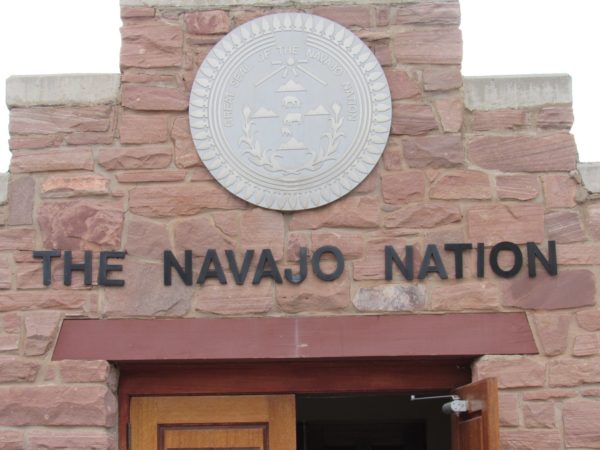
- Details
- By Native News Online Staff
WINDOW ROCK, Ariz. — Navajo Nation officials cite delays in Christmas holiday reporting for 23 deaths, a larger than normal number of deaths in any given day, reported on New Year’s Eve on the Navajo Nation. The total number of deaths is now 806 as of Thursday.
The large number of deaths came with a higher number of new reported Covid-19 cases.
"We are informed that the very high numbers of new cases and deaths reported yesterday and today are largely due to delays in reporting due to the recent Christmas holiday. However, we understand that we are still in a dire situation just like the rest of this country," Navajo Nation President Jonathan Nez on Thursday afternoon.
On Thursday, Dec. 31, 2020, the Navajo Department of Health, in coordination with the Navajo Epidemiology Center and the Navajo Area Indian Health Service, reported 287 new Covid-19 positive cases for the Navajo Nation and 23 more deaths.
Reports indicate that 11,741 individuals have recovered from Covid-19, and 203,948 Covid-19 tests have been administered. The total number of positive Covid-19cases is now 23,090, including 27 delayed reported cases.
Navajo Nation Covid-19 positive cases by Service Unit:
- Chinle Service Unit: 4,316
- Crownpoint Service Unit: 2,353
- Ft. Defiance Service Unit: 2,419
- Gallup Service Unit: 3,754
- Kayenta Service Unit: 2,207
- Shiprock Service Unit: 4,012
- Tuba City Service Unit: 2,569
- Winslow Service Unit: 1,434
* 26 residences with Covid-19 positive cases are not specific enough to place them accurately in a Service Unit. Health care officials believe the high number of new cases and deaths reported for the Navajo Nation on Thursday, is due to the delay in reporting cases due to the recent Christmas holiday. Covid-19 testing schedules are available online at the Navajo Health Command Operations Center website: https://www.ndoh.navajo-nsn.gov/COVID-19/COVID-19-Testing.
On Thursday, the state of Arizona reported 7,718 new cases, Utah reported 4,672, and New Mexico reported 1,684 new cases.
“We offer our condolences and prayers for all of the families that have lost loved ones due to Covid-19. We all have to remember that the resilience of our ancestors is still within each of us to this day. Through their strength and their teachings, we will overcome this pandemic. With the New Year upon us, we look forward to having a stronger and healthier year ahead. There are many lessons to be learned from the pandemic we are facing and it’s up to us to use those teachings to help make us even stronger in the future," Nez said.
"Please celebrate the New Year safely at home with your immediate household members only,” Nez added.
On Thursday, President Nez, Speaker Seth Damon, several members of the 24th Navajo Nation Council, and Navajo Area IHS Chief Medical Officer Dr. Loretta Christensen received the first dose of the Pfizer vaccine during a live online town hall to help boost public confidence in the vaccines.
“The vaccines are another weapon in this fight against Covid-19. We have lost many of our family, friends, and relatives to this invisible monster, but soon all of our people will have the opportunity to receive a vaccine. Many of our health experts, health care workers, leaders, and others across the country have taken the first dose of the vaccines. We want to show our people that the vaccine is safe and that it will help to prevent the coronavirus once we receive the second dose,” added President Nez.
For more information, including helpful prevention tips, and resources to help stop the spread of Covid-19, visit the Navajo Department of Health's Covid-19 website: http://www.ndoh.navajo-nsn.gov/COVID-19. For Covid-19 related questions and information, call (928) 871-7014.
More Stories Like This
Native News Weekly (August 25, 2024): D.C. BriefsNavajo Nation Mourns the Passing of Former Vice President Rex Lee Jim
Deb Haaland Earns Endorsement From Communications Workers of America Local 7076
University Soccer Standout Leads by Example
Two Native Americans Named to Democratic Congressional Campaign Committee's“Red to Blue” Program
Help us defend tribal sovereignty.
At Native News Online, our mission is rooted in telling the stories that strengthen sovereignty and uplift Indigenous voices — not just at year’s end, but every single day.
Because of your generosity last year, we were able to keep our reporters on the ground in tribal communities, at national gatherings and in the halls of Congress — covering the issues that matter most to Indian Country: sovereignty, culture, education, health and economic opportunity.
That support sustained us through a tough year in 2025. Now, as we look to the year ahead, we need your help right now to ensure warrior journalism remains strong — reporting that defends tribal sovereignty, amplifies Native truth, and holds power accountable.
 The stakes couldn't be higher. Your support keeps Native voices heard, Native stories told and Native sovereignty defended.
The stakes couldn't be higher. Your support keeps Native voices heard, Native stories told and Native sovereignty defended.
Stand with Warrior Journalism today.
Levi Rickert (Potawatomi), Editor & Publisher

